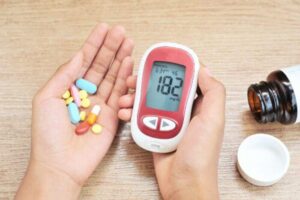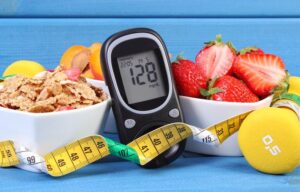Diabetes, a chronic condition affecting millions worldwide, is traditionally associated with genetic predisposition, lifestyle factors, and dietary choices. However, an often-overlooked aspect of diabetes risk comes from an unexpected source: medications. While these drugs are prescribed for valid health reasons, certain medications can inadvertently increase the risk of developing diabetes. This blog aims to shed light on these medications that cause diabetes and what steps can be taken to mitigate this risk.
Contents
What Are The Medications That Cause Diabetes?
 Several medications have been linked to an increased risk of developing diabetes, either by directly influencing blood sugar levels or by affecting the body’s sensitivity to insulin. It’s essential to note that while these medications can increase diabetes risk, they are often necessary for managing other health conditions. Here is a list of some of the medication categories known to potentially cause diabetes:
Several medications have been linked to an increased risk of developing diabetes, either by directly influencing blood sugar levels or by affecting the body’s sensitivity to insulin. It’s essential to note that while these medications can increase diabetes risk, they are often necessary for managing other health conditions. Here is a list of some of the medication categories known to potentially cause diabetes:
Corticosteroids and Diabetes Risk
Corticosteroids, powerful anti-inflammatory medications, are indispensable in treating a variety of autoimmune and inflammatory conditions, including asthma, arthritis, and lupus. However, their use, especially at high doses or over extended periods, can lead to elevated blood sugar levels. This effect is due to corticosteroids’ tendency to interfere with the body’s insulin response, increasing insulin resistance and, consequently, blood glucose levels.
Atypical Antipsychotics
These medications are cornerstones in managing psychiatric disorders such as schizophrenia and bipolar disorder. Drugs like olanzapine (Zyprexa) and quetiapine (Seroquel) have been linked to an increased risk of developing diabetes. They can cause significant weight gain and changes in the body’s ability to use insulin, leading to insulin resistance. It’s crucial for patients taking these medications to have regular monitoring of their glucose levels and overall metabolic health.
Statins and Diabetes
Statins are widely prescribed to lower cholesterol levels and reduce the risk of cardiovascular disease. However, research has suggested that some statins may slightly increase the risk of developing diabetes. The mechanism is not fully understood but may involve statins impairing the ability of pancreatic β cells to produce insulin. Patients using statins should not discontinue their medication without consulting a doctor but should be aware of this risk and undergo regular blood sugar screening.
Thiazide Diuretics
Commonly prescribed for hypertension, thiazide diuretics can impact glucose tolerance. And leading to an increased risk of type 2 diabetes. This effect may be due to potassium depletion, which affects insulin sensitivity. Patients on thiazide diuretics should be aware of this potential side effect and consider regular monitoring of blood glucose levels, especially if they have other diabetes risk factors.
Beta-Blockers
Essential in treating hypertension and heart disease, beta-blockers can affect glucose metabolism and mask symptoms of hypoglycemia (low blood sugar), such as rapid heartbeat. Some beta-blockers are more likely to affect insulin sensitivity and glucose metabolism than others. Patients using beta-blockers should be educated about recognizing hypoglycemia’s non-cardiac symptoms and possibly monitor their blood sugar levels more frequently.
HIV Antiretroviral Drugs
Antiretroviral therapy has transformed HIV into a manageable chronic condition. However, some HIV medications can interfere with insulin sensitivity and glucose metabolism, increasing the risk of diabetes. The mechanism may involve direct effects on insulin action or side effects such as lipodystrophy. This affects how the body uses and stores fat. Regular glucose monitoring and lifestyle interventions may help manage this risk.
Immunosuppressive Drugs
Tacrolimus and cyclosporine are crucial in preventing organ transplant rejection. However, they can increase the risk of post-transplant diabetes mellitus (PTDM), particularly in patients with other risk factors for diabetes. Monitoring glucose levels before and after transplant surgery is essential for early detection and management of PTDM.
Niacin (Vitamin B3)
Although niacin is beneficial for controlling high cholesterol, its high doses can lead to elevated blood sugar levels. This effect is due to niacin’s ability to interfere with glucose metabolism. Patients using niacin for cholesterol management, especially those with pre-existing risk factors for diabetes, should monitor their blood sugar levels and discuss potential risks with their healthcare provider.
Second-Generation (Atypical) Antipsychotics
Beyond the aforementioned atypical antipsychotics, others, like clozapine (Clozaril, FazaClo), may also pose a higher risk of diabetes than first-generation antipsychotics. These medications can cause significant weight gain and metabolic changes, leading to increased diabetes risk. Monitoring metabolic health is vital for patients on these medications, including regular screening for signs of diabetes.
Understanding the complex relationship between these medications and diabetes risk is critical for both patients and healthcare providers. It allows for informed decision-making regarding treatment options and emphasizes the importance of monitoring and preventive measures to mitigate the risk of medication-induced diabetes.
How To Prevent Diabetes Caused By Medications?
 Preventing medication-induced diabetes is a crucial aspect of managing treatments for various conditions, especially when the prescribed medications have known risks of affecting blood sugar levels. Here are expanded strategies to mitigate this risk effectively:
Preventing medication-induced diabetes is a crucial aspect of managing treatments for various conditions, especially when the prescribed medications have known risks of affecting blood sugar levels. Here are expanded strategies to mitigate this risk effectively:
Monitoring of Blood Glucose Levels
Continuous and regular monitoring of blood glucose levels is essential for individuals on medications known to impact blood sugar. This practice allows for the early identification of elevated glucose levels, providing an opportunity for interventions before the onset of diabetes. Healthcare providers can recommend the frequency of monitoring based on the medication and the individual’s health status.
Informed Medication Choices
Engaging in open discussions with healthcare providers about the potential diabetes risk associated with certain medications is crucial. For some conditions, there may be alternative treatments with a lower risk profile. Patients should feel empowered to ask about these alternatives and the comparative risks and benefits.
Dose Management
Optimizing medication doses to the minimum effective level can reduce the risk of side effects, including elevated blood sugar. This approach should always be done under the guidance of a healthcare provider, who can adjust dosages or medication types based on effectiveness and side effects.
Proactive Healthcare Engagement
Regular consultations with healthcare professionals enable ongoing assessment of medication effects and overall health. These check-ups are opportunities to adjust treatment plans, address new health concerns, and discuss preventive measures for medication-induced diabetes.
Education on Hypoglycemia Recognition
For those on beta-blockers or similar medications that can mask the symptoms of low blood sugar, learning to recognize alternative hypoglycemia indicators (such as dizziness, sweating, and hunger) is essential. This knowledge ensures timely and appropriate responses to hypoglycemic events.
Managing Other Risk Factors
Controlling other diabetes risk factors, such as high blood pressure or cholesterol, can also lower the likelihood of developing medication-induced diabetes. This comprehensive approach to health can mitigate the cumulative risk associated with various conditions and treatments.
Medication Review and Adjustment
A periodic review of all medications with a healthcare provider is advisable, particularly for those taking multiple drugs affecting blood sugar. Adjustments, whether changing the medication, altering the dose, or switching the timing of doses, can sometimes minimize risks.
Consideration for Supplemental Treatments
Supplements or specific lifestyle changes recommended by a healthcare provider, such as adopting a low-glycemic diet or increasing fiber intake, can support healthy glucose metabolism. It’s vital to consult with a healthcare professional before incorporating new supplements or significant dietary changes to ensure they’re appropriate and safe.
By embracing these strategies, individuals taking medications with a potential risk of inducing diabetes can take proactive steps to mitigate this risk, ensuring both their immediate health needs and long-term well-being are addressed.
Lifestyle Changes For Medications That Cause Diabetes
 When taking medications that cause diabetes or increase the risk of developing, implementing lifestyle changes is crucial for minimizing this risk. Here’s how individuals can adapt their lifestyle when on such medications:
When taking medications that cause diabetes or increase the risk of developing, implementing lifestyle changes is crucial for minimizing this risk. Here’s how individuals can adapt their lifestyle when on such medications:
Adopt a Balanced Diet
- Low-Glycemic Index Foods: Focus on foods that have a minimal impact on blood sugar levels. These include most fruits and vegetables, whole grains, nuts, and legumes.
- Reduce Sugar and Refined Carbs: Limit foods high in added sugars and refined carbohydrates, such as white bread, pastries, and sugary drinks, as they can quickly spike blood sugar levels.
- Healthy Fats: Incorporate sources of healthy fats, such as avocados, olive oil, and fatty fish. These can help with satiety and may have a positive effect on blood sugar control.
- Hydration: Drinking plenty of water helps maintain hydration and can support the kidneys in processing and excreting excess glucose through urine.
Increase Physical Activity
- Regular Exercise: Engage in at least 150 minutes of moderate-intensity aerobic activity per week, such as brisk walking, cycling, or swimming, along with muscle-strengthening activities on two or more days a week.
- Consistency: Make physical activity a part of your daily routine. Even short bouts of activity, like walking after meals, can help in managing blood sugar levels.
- Variety: Include a mix of cardio, strength training, and flexibility exercises to improve insulin sensitivity, manage weight, and reduce stress.
Weight Management
- Monitor Your Weight: Keep track of your weight regularly. Small, sustainable changes in diet and exercise can lead to significant benefits in weight management and insulin sensitivity.
- Set Realistic Goals: Aim for gradual weight loss if overweight, focusing on long-term sustainability rather than quick fixes.
Stress Management
- Relaxation Techniques: Stress can affect blood sugar levels. Techniques such as meditation, deep breathing exercises, and yoga can help reduce stress.
- Adequate Sleep: Ensure you get enough quality sleep. Poor sleep can affect the body’s insulin use and glucose control.
Avoid Tobacco and Limit Alcohol
- Smoking Cessation: Smoking can increase insulin resistance. Quitting smoking can improve your overall health and help in managing blood sugar levels.
- Moderate Alcohol Consumption: If you choose to drink alcohol, do so in moderation. Alcohol can have varying effects on blood sugar; understanding these effects can help you make informed decisions.
Adopting these lifestyle changes can significantly reduce the risk of developing diabetes when taking medications that have diabetes as a potential side effect. These changes not only help in managing blood sugar levels but also contribute to overall health and well-being.
Conclusion
In conclusion, while certain medications are essential for managing various health conditions, they can also carry the risk of inducing diabetes. However, medications that cause diabetes risk can be effectively managed and minimized through informed decision-making, regular health monitoring, and proactive lifestyle adjustments.
By fostering open communication with healthcare providers and making informed choices about medication and lifestyle, individuals can safeguard their metabolic health. Do you want to get rid of diabetes? Join our online diabetes treatment program and reverse Diabetes naturally through lifestyle changes such as a Personalized Diet plan, Exercise, Yoga, dieticians, and health coaches.

